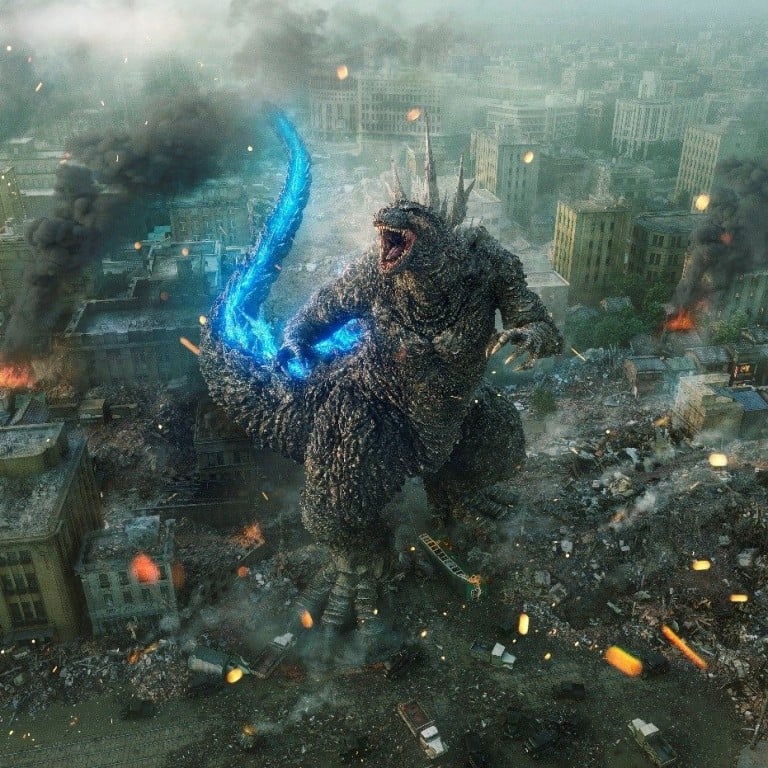
Ranked: the 12 best Asian films of 2023, from Concrete Utopia to Hidden Blade and Godzilla Minus One
- From dark tales and ghost stories to a cyberpunk sci-fi thriller and a film about a toilet cleaner, we pick the 12 best Asian films of 2023
- On the list: the 37th Godzilla movie, a Korean disaster film centred on a block of flats, a Tony Leung Chiu-wai spy thriller, a basketball anime and more
As 2023 draws to a close, it’s time to take stock of the year’s most exciting and noteworthy feature films from around Asia.
From effects-laden blockbusters and dramas to impressive debuts from emerging talent, here are this writer’s picks for the 12 best new films from across the region.
12. In My Mother’s Skin
Set in a remote corner of the Philippines during World War II, Kenneth Dagatan’s dark fairy tale follows the efforts of a young girl to care for her ailing mother.
As the men are distracted by a seemingly hopeless treasure hunt, and the Japanese occupation encircles their once opulent home, the young heroine becomes increasingly bewitched by a mysterious woman living out in the forest.
Unspooling like a Southeast Asian response to Guillermo del Toro’s Pan’s Labyrinth, Dagatan’s film is a visually ravishing supernatural treat brimming with ancient magic.
Did you hate Believer 2? The 10 best Korean film sequels to watch instead
11. 24 Hours With Gaspar
It is a rare treat when a science fiction movie emerges from Southeast Asia’s independent film scene, and even rarer when it proves as good as Yosep Anggi Noen’s cyberpunk detective thriller.
Rena Rahadian plays the titular motorbike-riding sleuth with a weak heart who has just 24 hours to take down a notorious criminal and hopefully unveil the truth behind his childhood sweetheart’s disappearance.
Oozing with style, ambition and laudable optimism, this is the kind of bold swing that happens all too rarely in Asian filmmaking, and thoroughly deserves our support.
10. Perfect Days
Wim Wenders fashioned an absorbing and enigmatic drama, conceived in collaboration with the Tokyo Toilet Project, in which 16 designers from around the world created innovative, architecturally inspiring public conveniences around the Japanese capital’s Shibuya district.
9. Back Home
First-time director Nate Tse Ka-ki’s eerily unsettling ghost story is one of the most keenly observed commentaries on Hong Kong’s fast-evolving status.
Anson Kong Ip-sang, a member of Hong Kong boy band phenomenon Mirror, plays a troubled young man who returns to the city after years living overseas.
Struggling to recognise his homeland and haunted by unsettling childhood memories, he returns to his old flat, where the building’s residents give him a creepy homecoming.
8. Concrete Utopia
In the wake of a massive earthquake, only one apartment building remains standing. For survivors in the surrounding area it becomes a beacon of hope, but for the residents it must be fiercely protected.
Um Tae-hwa’s effects-laden disaster movie serves as a scathing allegory of South Koreans’ growing obsession with property and status.
At the centre of his star-studded cast, Lee Byung-hun gives his best performance in years as a mysterious stranger who rises from the rubble to become dubious leader of the estate’s inundated population.
Ranked: 10 must-watch Korean disaster movies to see before you die
7. Evil Does Not Exist
Hitoshi Omika is brilliant as the jack of all trades in a small, self-sufficient community that has been targeted as the site for a glamorous new campsite for urban tourists.
6. Hidden Blade
Set during the Japanese occupation and boasting some of the year’s most sumptuous production design, this delightfully noirish indulgence succeeds as a loving ode to the cloak-and-dagger adventures of yesteryear.
5. Killing Romance
One of the year’s most singular cinematic experiences, Lee Won-suk’s genre-bending comedy musical delivered a welcome shot of playful silliness, even as it skewered a number of serious issues.
Lee Hanee stars as a celebrity who becomes trapped in an abusive relationship and calls upon her small yet devoted fan base to save her, but it is Lee Sun-kyun who steals the show as the film’s grotesquely over-the-top pantomime villain.
4. In Broad Daylight
Jennifer Yu Heung-ying cements her position as one of Hong Kong’s most compelling and versatile leading ladies with her role as a jaded and world-weary newspaper reporter who uncovers a shocking scandal involving negligence, exploitation and abuse at a private care home.
Based on real events, and emblematic of a culture in which the elderly and disabled are all too readily disrespected and discarded, Lawrence Kan Kwan-chun’s riveting drama is one of the most accomplished Hong Kong films in recent memory.
3. Tiger Stripes
In one of the year’s most electrifying debuts, director Amanda Nell Eu turns a scathing critique of Malaysia’s suffocating patriarchy into a red-blooded body-horror fable, as a 12-year-old girl from a conservative rural community faces a torrent of abusive body shaming from her classmates, teachers and mother when her body begins to change.
Acid attacks, death threats: Malaysian filmmakers in trouble with conservatives
2. The First Slam Dunk
Takehiko Inoue’s exhilarating, edge-of-your-seat tour de force combines 3D computer graphics with motion capture technology and traditional hand-drawn animation to transport audiences into the world of the Shohoku High basketball team in a way never experienced before.
1. Godzilla Minus One

